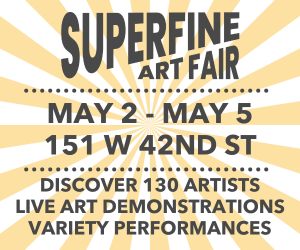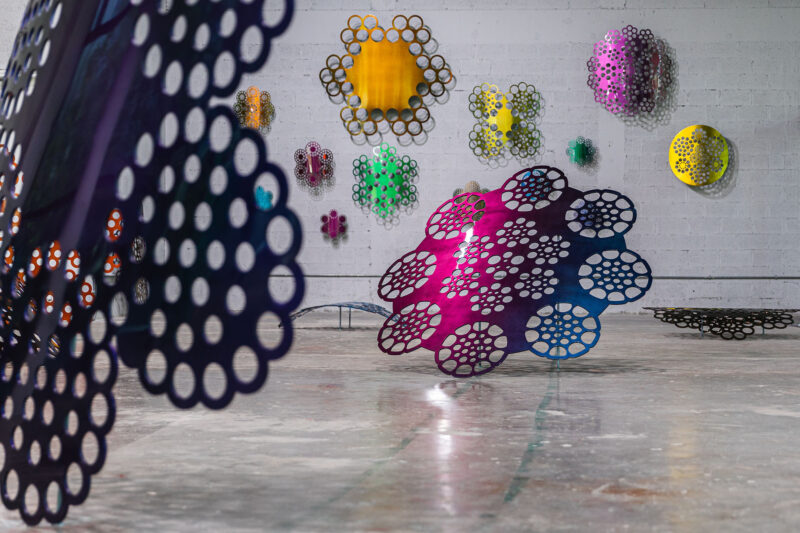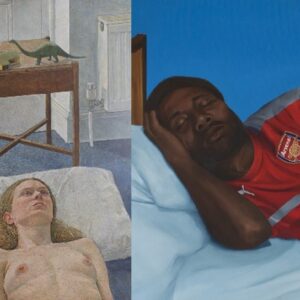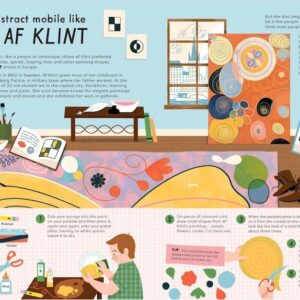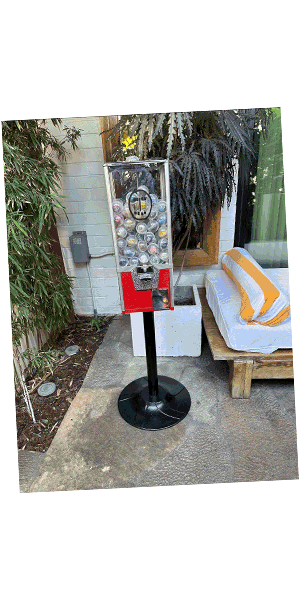In the first of this new FAD series of interviews with digital talent in the crypto-art space, MOOGZ aka Matthew O’Donnell talks to artist WEBB, aka Thomas Webb about the intersection of video games and art, the digital identity, and the potential of creating new worlds online. After meeting WEBB’s in-game pixel-art avatar, MOOGZ caught up remotely “in real life” with Hackney, London-based WEBB to talk about the new online non-fungible token (NFT)-enabled experience, the online immersive 2D art-game titled “WEB3 Metaverse”.
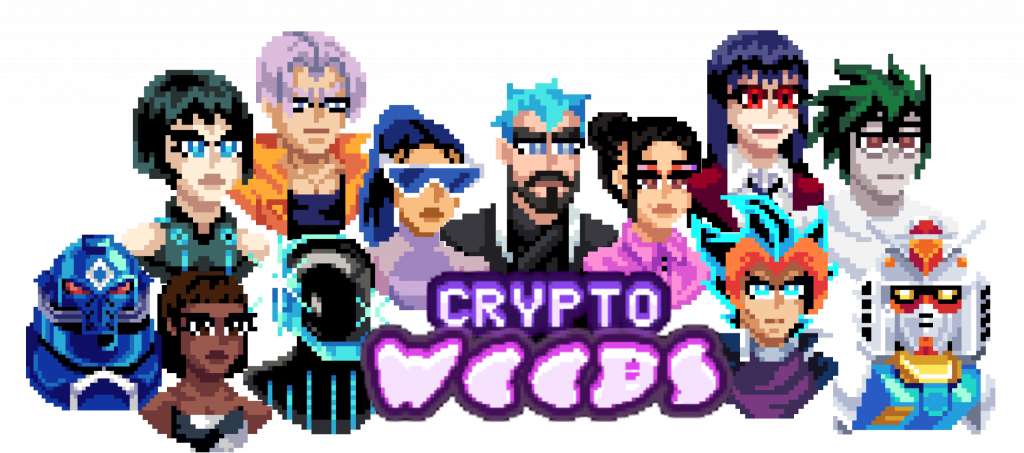
As part of the ongoing contribution to the NFT digital ecosystem, WEBB is launching the massively multiplayer roleplaying game, World Web WEB3 Metaverse at www.crypto-weebs.com. Visitors to Metaverse can play the game and follow WEBB’s avatar into the story-led game world. With a MetaMask crypto-wallet connected to the browser, players can unlock new game stories and avatars by bidding on NFTs on OpenSea.
The first 69 anime-inspired NFT drops include avatars offering a satirical take on pop-culture figures with names like “Pylon Musk” and “Hef Benzos”. All 69 swiftly sold out to 43 buyers demonstrating a vibrant energy committed by an active community of players occupying WEBB’s Metaverse and its accompanying Discord chatrooms. The language of the chatrooms is English while the in-game spoken language is Japanese with English subtitles.

The avatars and playable Metaverse see WEBB explore themes surrounding mental health, addiction, data control, and society’s dependence on technology. By design, the avatars nod to some of these themes, and their personalities mirror modern-day issues that are experienced by the artist’s generation.
Outlining the aim of the WEB3 Metaverse, WEBB opens up with the mission statement:
“My goal is to create a fully-functional virtual Metaverse based around NFT’s in which everything is unique, everything is tradeable, and the marketplace is truly open.
Supporting principles of free creation, free trade and decentralized finance, my goal is for the World Wide WEB3 to provide guidance into how we can push the boundaries of how NFTs are used, creating both physical and virtual experiences that are free from restriction.
More often than not, the Metaverses I see lack direction, and lack interactivity; I want to use a different approach, creating a fully immersive world in which anything is possible, all powered by the blockchain. You want to buy new clothes? No problem. You want to advertise your new business? We can do that. How about the ability to fly? Or change your clothes? Or live stream a DJ set in the nightclub that you own? Or create and sell your own mini-game? Absolutely anything is possible in an open source community that’s not restricted by anyone marketplace, app store, or billionaire creator.
This series of drops is just the beginning.
“We are creating for, and from within the crypto community; we have a big vision and an amazing team on hand to turn that vision into reality.”
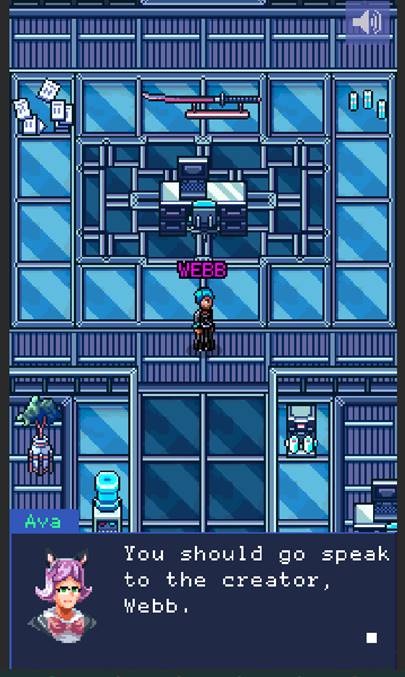
What themes do your games explore?
The work is about systems.
It’s really outrageous. Addressing themes about what is life like, how do we interact, introducing characters with complex backstories.
What is happening in the moment for the generation that’s about to go into work as digital natives?
How do their social dynamics work?
As an artist, there’s an ability to shape the future. I want to explore not how it’s going to look, cos it’s pixel art, but rather how it’s going to operate.
The game shows how our social dynamics, the economy and other systems work.
That’s not a traditional artistic approach, and I’m building systems and worlds as an artist/developer.
In the last game (presented online by König Galerie as a 2D multiplayer game“An exercise in hopeless Nostalgia”) there was a queue for Berghain club in Berlin, where after waiting you’re simply told you can’t come in.
Friends who hadn’t seen each other for a while met up in the virtual queue for Berghain, which served no purpose than just to make you wait and play with that idea.
I intend to do way more f*cked up pointless shit, reminding us all what recent pre-covid history was like.
The Berghain queue in the previous game is one example of your work that outlines systems of control in society. How else does your work continue this discourse?
As a hacker, I build games, worlds, situations which are rigged in my favour. It looks like a fun or monotonous experience.
That’s where the fascination for building worlds comes from: I built an environment where in the background, the game was doing a 16 personality test on the player. The game would count how many times objects were interacted with to work them out. Determine whether somebody is an extrovert or introvert; whether people try to go through the locked door, and whether you’re the type of person who likes to follow orders or try your own approach.
I’m trying to encourage people. From the hacker point of view, the game asks the question: how can I control people and get them to do exactly what I want?
If you’re playing it for 6 hours I’ve immersed you in this world – and it’s a game where there’s no fighting.
The WEB3 Metaverse avatars open an avenue for a new identity as an online character. How do you see the internet shaping identity?
“Everyone’s scared to be themselves”.
People are afraid of showing their true colours.
We mask ourselves in digital identities, curated and viewed as being cool or admirable, so it raises the question: are we really ourselves?
One of the topics being constantly addressed in my work is: what even is identity?
Anxiety is at an all-time high. People are more anxious than ever, and it’s so easy to be judged.
People can be judged anonymously by trolls while already having a hard enough time.
Cosplay has blown up, enabling people to adopt avatar identities of whomever they like or admire, and they’ve become the most outspoken people on twitch.tv and other platforms.
People think they’re not enough. The internet presents instantaneous competition.
Swiping down the feed there’s constant competition being posted by other people who are more intelligent, successful, interesting or people doing work that’s better than yours, whether it’s relationships, work or whatever else the competition remains relentless.
I made a piece about it called “I’m enough”
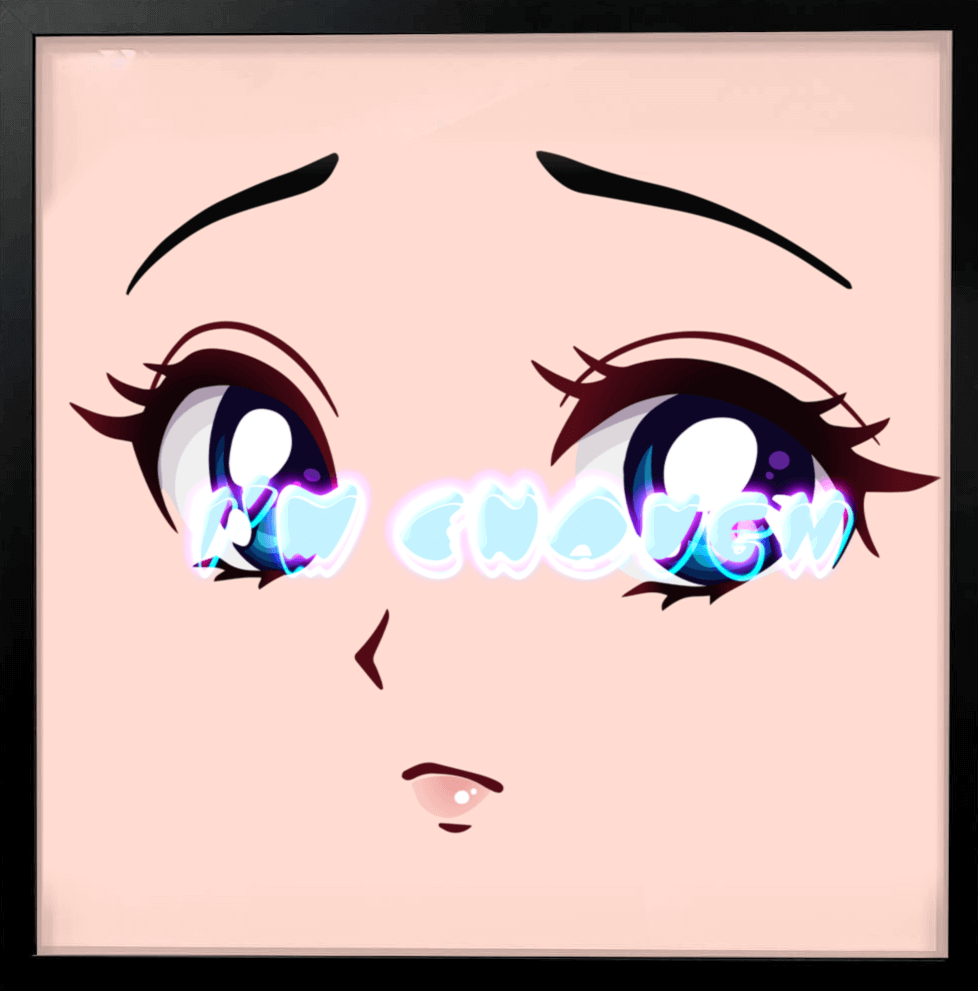
The work goes back to the bible. The whole book is telling you “life’s gonna be pretty sh*tty cos there’s salvation at the end”.
Now we know we’re sh*tty from the age of 13 because everyone’s telling us that on the internet.
We’re not meant to be hyper-connected.
What’s your take on the potential impact on our attachment to “real life” possessions?
Kids don’t care about real sh*t.
They care about what they can flex online which is where they spend time with their friends that they know in real life. However, a lot of their friends are from over the world and it’s not possible to share or engage with them in the real world.
Lockdown made me realise how nice it is to have a good sofa or pans, but on the other hand, I didn’t buy new clothes, so certainly a reduced emphasis on “real life” fashion.
The impact is only going to become greater. It’s inevitable that we will buy augmented reality clothes and filters, augmented reality (AR) sculptures, and artworks, and then we want to show them to our friends.
There are other NFT Metaverses such as Decentraland or Cryptovoxels which are experientially different from yours. Those Metaverses are receiving attention from institutions and collectors. How do you see WEB3 positioned in the constellation of Metaverses?
Everyone’s approaching Metaverses in a different way to how I’m doing it. WEB3 is more of an artwork in itself about how the Metaverse might look and feel with all the constructive things, but not actually go into it and build it yourself like in Minecraft. It’s positioned more like “here’s a world built by its community” and it’s more of a story about that itself. It examines how people operate online, how they play video games.
The Metaverse conversation is really important in the context of galleries trying to transition to see it happening now. The tech isn’t quite there yet and the software exceeds the ability of the hardware. WEB3 explores the pitfalls of the Metaverse.
How do NFTs fit into the game flow?
I want people to be able to reach the game with or without NFTs. The game doesn’t demand a wallet; independently from WEB3, the NFT crypto purchases are relevant and accessible only if the wallet is connected.
When a wallet is connected, the NFTs unlock in-game quests and narratives and avatars, and powers. They’re unlocked like cheat codes. It raises the question of how do NFTs change systems, control and power?
For example, a player can become president of the Metaverse by owning that title as an NFT. It’s a position of power bought by the highest bidder, not via democracy, so it’s elitist in a weird capacity. I’m interested in those aspects nobody’s thought about yet.
Gazing into your crystal ball, what do you see in the future at the intersection of games and art?
Video games will become the forefront of experience.
Look at the film industry; everyone’s watching Avengers 9.5 in 4D.
This is one step away from being a video game environment and more of those kinds of experiences will be seen as replacements.
Once we get a Sundance festival equivalent for the video game world we’ll see more video game experiences as replacements for traditional film.
If that’s the future, then I want to be the guy playing with notions of it works in practice.

About WEBB:
WEBB is a contemporary artist known for his hand-built AI-powered installations coined by the artist as AI ‘Portals’. WEBB is also known for incorporating video game engines, custom-written physics applications, and 3D rendering software to create themes inside a computer.
WEBB has challenged the barrier between viewer and technology by creating new methods of displaying computer-powered artwork in a quest to create a seemingly technology-free consummation of art. Hand-building various electronic machines and inventions to interpret programmed conceptual artworks into hyper-realistic four-dimensional artworks.
Inside his artworks, he questions the real-life scenarios and consequences formed through our newly acquired, daily use of technology. Harnessing real-time data feeds from mortality statistics, stock market prices, and social media feeds to juxtapose a reflection on ultimate contemporary life.
WEBB’s work has been shown in major galleries and institutions worldwide, in 2020 these included the Museum of Fine Arts, Leipzig, and the KÖNIG GALERIE at Ars Electronica. Recent commissions include Valentino and Mercedes-Benz. For Valentino, he built a series of holograms and AI-vision portals to align with a fashion show in Tokyo and an event at Art Basel Miami. For Mercedes-Benz he built an exhibition for Ars Electronica, Linz, using depth tracking, AI, and holograms to explore the future of advertising in conversation with artificial intelligence.
